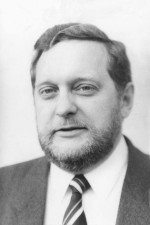
Дмитрий Дмитриевич Васильев (October 11, 1946 – January 18, 2021)
On January 18, 2021, due to complications resulting from coronavirus infection, Dmitry D. Vasiliev (Дмитрий Дмитриевич Васильев, October 11, 1946 – January 18, 2021) PhD (Hist.) famous Russian orientalist-turkologist, head of the Department of History of the Orient, Institute of Oriental Studies, Russian Academy of Sciences, Moscow, passed away at the age of 75.
He was a talented organizer of science and particularly successful as the– head of epigraphic expeditions of the Institute of Oriental Studies, Russian Academy of Sciences, for the study of monuments of ancient Turkic writing in Southern Siberia. He was a vice-president of the Society of Orientalists of the Russian Academy of Sciences, a corresponding member of the Russian Academy of Natural Sciences, Honored Scientist of the Republic of Tuva, and an honorary member of the Atatürk Kültür, Dil ve Tarih Yüksek Kurumu (Atatürk Culture, Language and History High Authority).
The main field of Dmitry D. Vasiliev’s scientific investigations was research and systematization of monuments in ancient Turkic script. In 1983 he defended his PhD thesis on the topic “Paleographic systematization of monuments in the Turkic runic script of the Asian area”.
Dmitry D. Vasiliev is the author of a large number of scientific monographs and articles, including “Corpus of monuments in the Turkic runic script of the Yenisei basin” (1983), “Graphic fund of monuments in the Turkic runic script of the Asian area” (1983), “ORHUN” (1995), “Orthodox shrines of the Balkans” (co-authored) (2004), “Corpus of Turkic runic inscriptions of South Siberia” (2013), “From Central Asia to Anatolia. City and Man” (2013) (in Russian, English and Turkish), “Crimea in the Past in Old Photographs” (2006) (co-authored).
D. Vasiliev’s scholarly prestige was also underlined by his membership of editorial boards of Russian and foreign scientific periodicals such as “Vostok” (Orient), “Vostochnyy Archiv” (Oriental Archives), “Epigrafika Vostoka” (Epigraphy of the East), “Tyurkologiya” (Turkology) (Turkestan, Kazakhstan), “Vestnik Instituta Vostokovedeniya RAN” (Journal of the Institute of Oriental Studies RAS), “Vostochnyy kur’yer” (Oriental Сourier).
Paying great attention to scientific and teaching activities, D. Vasiliev taught since 1995 at the Russian State University for the Humanities where he held Turkish language classes and gave the courses “Introduction to Turkology”, “Country Studies”, and “Historiography of Turkey”. He educated a pleiad of young scholars who now successfully work in various Russian research institutes.
D. Vasiliev made a huge contribution to the development of Turkology in Russia. He had the honour of winning numerous awards, including the Kublai Khan medal (Mongolian Academy of Sciences), the medal “For services in the development of science of the Republic of Kazakhstan”, the commemorative medal “For the contribution to the study of history and culture of the Republic of Tuva”, the “I. Yu. Krachkovsky medal” of the Institute of Oriental Studies, the award “For services in the field of culture, history, language and literature of the world of the Turkic peoples” from the Turkish Foundation “International Valeh Hacilar Foundation of Science and Research”. In 2020, by the decree of the Government of the Republic of Tuva, D. Vasiliev was awarded the order “For Labor Valor” for his contribution to the development of science in the republic.
D. Vasiliev was a high-level professional, distinguished by deep knowledge of the subject of research, breadth of scientific interests, as well as high human qualities.
Dmitry Vasiliev’s sudden departure from life is an irreparable loss for his relatives, friends and colleagues.
Source: Homepage of the Institut Vostokovedenia RAN, translated by Elena V. Boykova.
The Institute of Oriental Manuscripts of the RAN also published an obituary.
The international PIAC family mourns D. D. Vasiliev who attended a number of Annual Meetings where his jovial presence, kindness and fine humour were appreciated by everybody.

